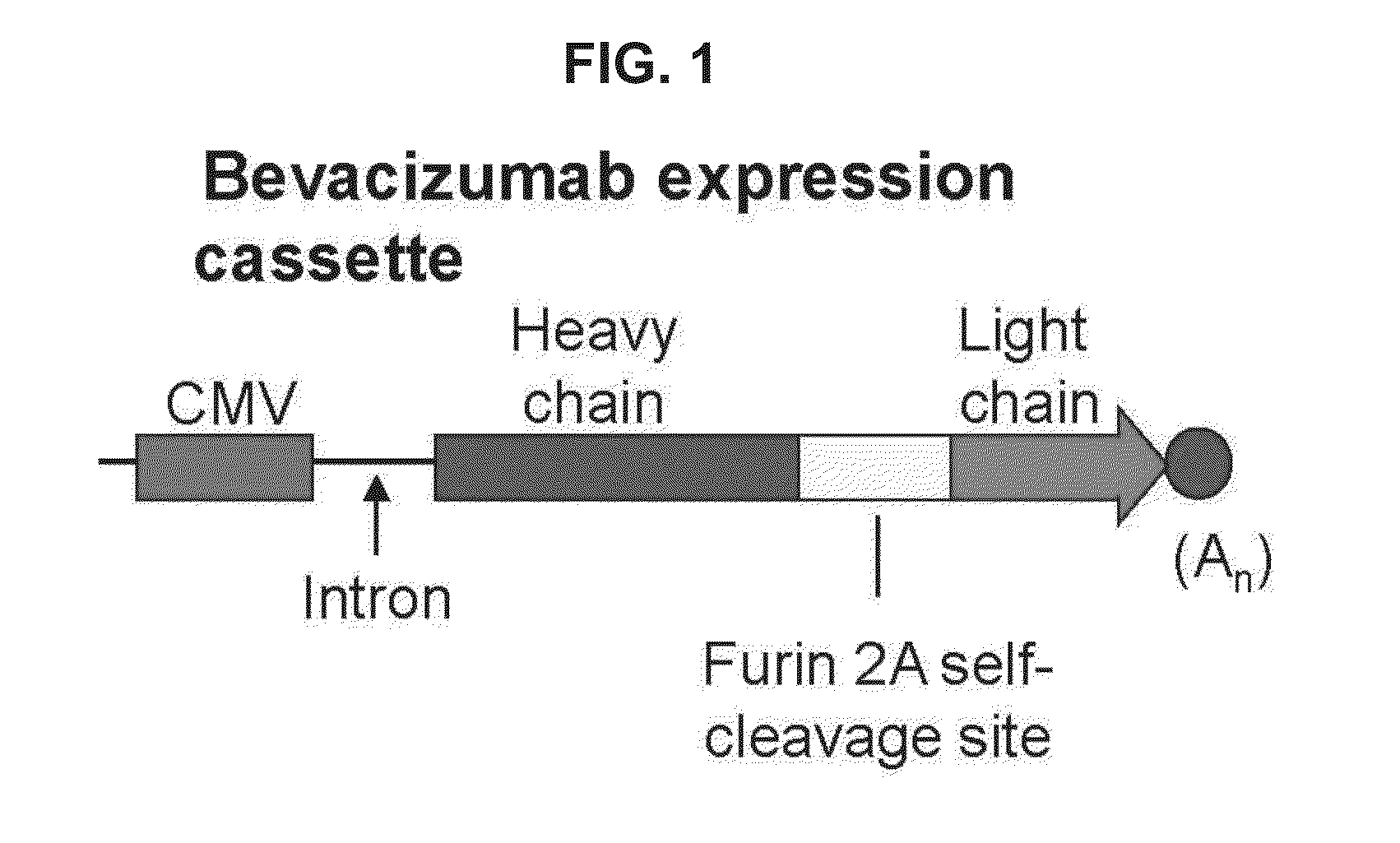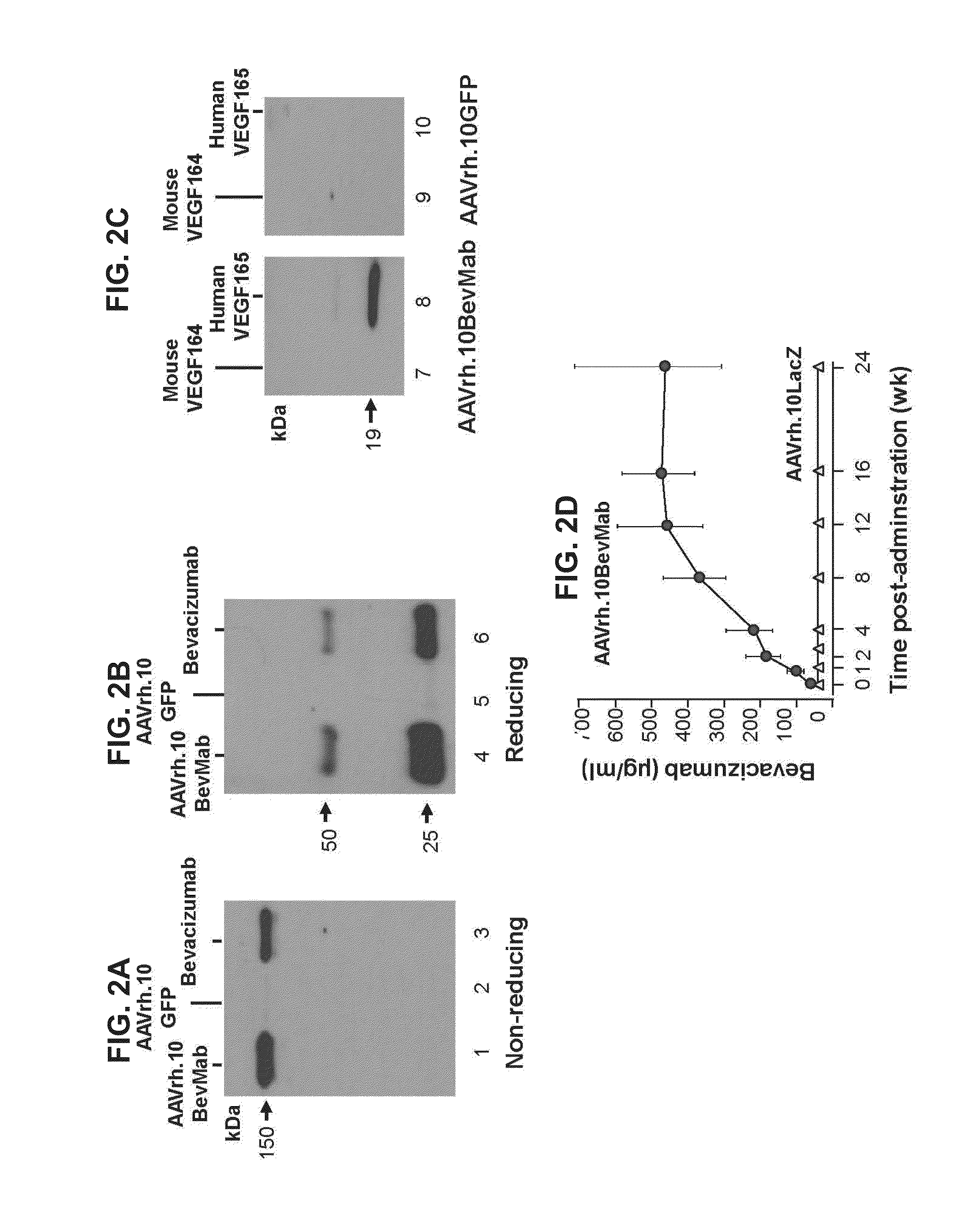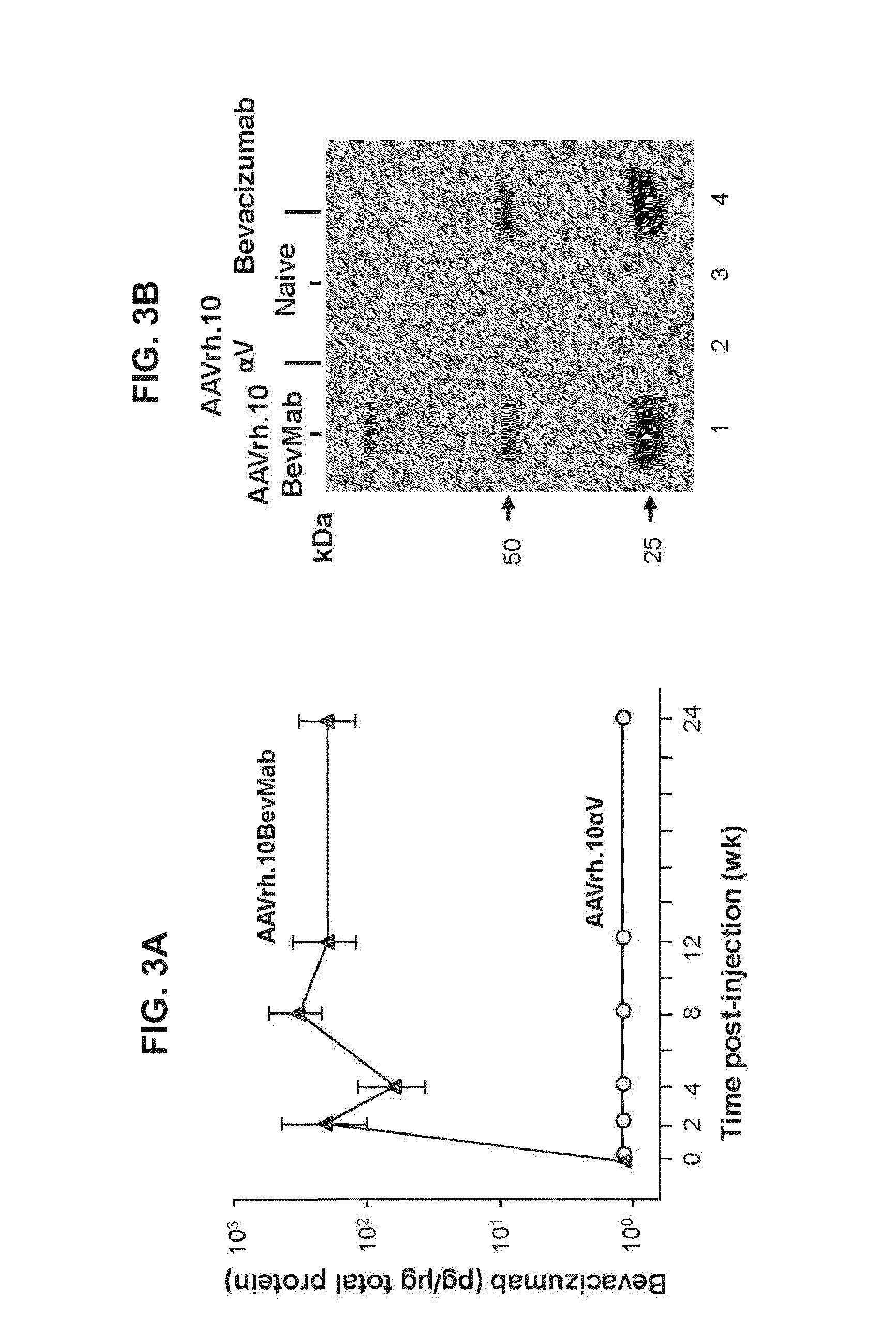Virus-mediated delivery of bevacizumab for therapeutic applications
a technology of bevacizumab and virus, applied in the direction of dsdna viruses, drug compositions, peptides, etc., can solve the problems of significant burden on the patient and the health care system, risk of potentially devastating ocular complications, and limited positive effect on visual acuity, so as to reduce the total area of neovascularization and reduce the risk of ocular complications
- Summary
- Abstract
- Description
- Claims
- Application Information
AI Technical Summary
Benefits of technology
Problems solved by technology
Method used
Image
Examples
example 1
[0044]This example demonstrates the generation of an adeno-associated virus (AAV) vector comprising a nucleic acid sequence encoding bevacizumab.
[0045]AAVrh.10 is a Glade E, nonhuman primate (rhesus macaque)-derived gene-transfer vector that has been used in human clinical trials for gene therapy for CNS hereditary disease (Sondhi et al., supra). A bevacizumab-encoding AAV vector, AAVrh.10BevMab, was designed based on the AAVrh.10 capsid pseudotyped with AAV2 inverted terminal repeats (ITRs). The ITRs flanked an expression cassette containing (i) the cytomegalovirus (CMV)-enhancer chicken β-actin promoter (Niwa et al., Gene, 108: 193-199 (1991); Daly et al., Proc. Natl. Acad. Sci. U.S.A., 96: 2296-2300 (1999); and Sondhi et al., supra), (ii) nucleic acid sequences encoding the bevacizumab heavy and light chains separated by a furin 2A self cleavage site (Fang et al., Nat. Biotechnol., 23: 584-590 (2005)), and (iii) the rabbit α-globin polyadenylation signal. The bevacizumab cDNA exp...
example 2
[0050]This example demonstrates the expression and specificity of bevacizumab expressed from an AAV vector in vitro and in vivo.
[0051]The expression and specificity of bevacizumab encoded by AAVrh.10BevMab (described in Example 1) in vitro were assessed using Western blot analysis. For expression analysis, 293orf6 cells were infected with AAVrh.10BevMab (2×105 genome copies (gc) / cell), and infected cell supernatants were harvested 72 hours after infection. Supernatants were concentrated by passage through 1J1tracel YM-10 centrifugal filters (Millipore, Billerica, Mass.) and evaluated by Western analysis using a peroxidase-conjugated goat anti-human kappa light chain antibody (Sigma, St. Louis, Mo.) under nonreducing conditions or reducing conditions with the addition of peroxidase-conjugated goat anti-human IgG antibody (Santa Cruz Biotechnology, Santa Cruz, Calif.). Detection was by enhanced chemiluminescence reagent (GE Healthcare Life Sciences, Piscataway, N.J.).
[0052]The results...
example 3
[0058]This example demonstrates the expression and localization of bevacizumab following intravitreal administration of an AAV vector comprising a nucleic acid sequence encoding bevacizumab.
[0059]AAVrh.10BevMab (1010 gc) (described in Example 1) and control vector AAVrh.10αV (1010 gc) (described in Example 1) in 1 μl of PBS were administered by intravitreal injection to the left and right eyes, respectively, of C57BL / 6 male mice. Intravitreal injection was performed under a dissecting microscope with a 32-gauge needle (Hamilton Company, Reno, Nev.). At various timepoints 0-24 weeks after vector administration, mice were sacrificed with CO2. Eyes were collected, homogenized by sonication in 100 μl of T-PER tissue protein extraction reagent (Thermo Scientific, Rockford, Ill.), and centrifuged at 13,000 rpm for five minutes, followed by supernatant collection.
[0060]Bevacizumab expression levels in the supernatant were assessed by a human VEGF-specific ELISA as described in Example 2. B...
PUM
| Property | Measurement | Unit |
|---|---|---|
| molecular mass | aaaaa | aaaaa |
| pH | aaaaa | aaaaa |
| volume | aaaaa | aaaaa |
Abstract
Description
Claims
Application Information
 Login to View More
Login to View More - R&D
- Intellectual Property
- Life Sciences
- Materials
- Tech Scout
- Unparalleled Data Quality
- Higher Quality Content
- 60% Fewer Hallucinations
Browse by: Latest US Patents, China's latest patents, Technical Efficacy Thesaurus, Application Domain, Technology Topic, Popular Technical Reports.
© 2025 PatSnap. All rights reserved.Legal|Privacy policy|Modern Slavery Act Transparency Statement|Sitemap|About US| Contact US: help@patsnap.com



